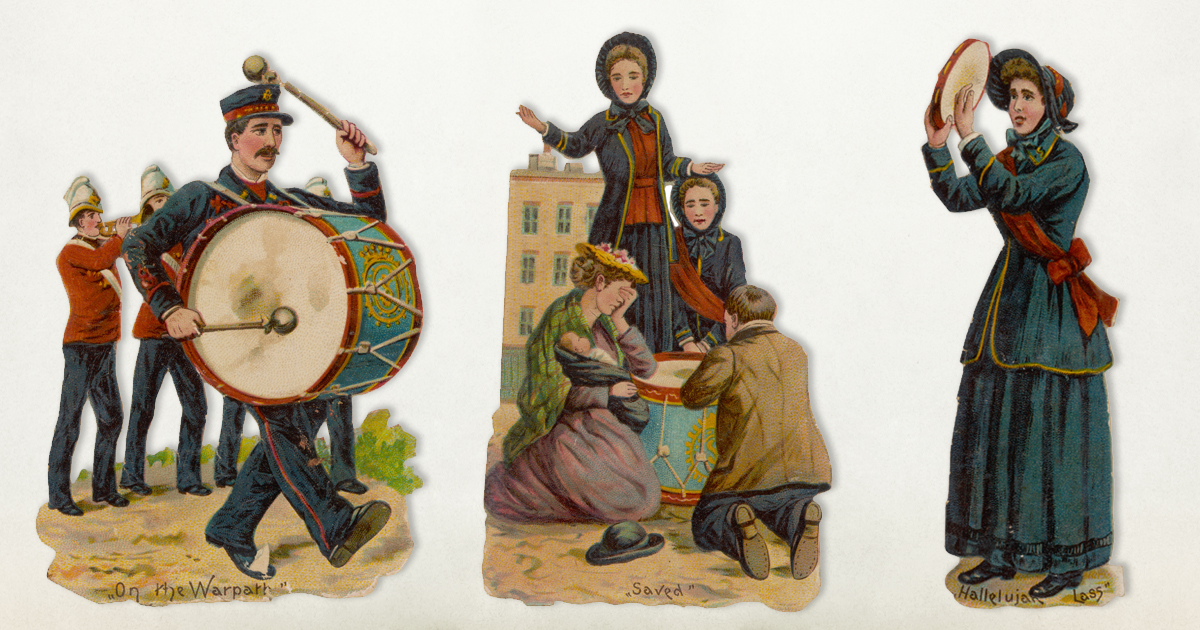There’s a story of a newly married couple who were preparing their first traditional roast beef dinner together. When the husband cut off the ends of the roast before putting it in the oven, his wife was perplexed and asked why. “That’s how my mom always did it,” he answered.
A few weeks later, they visited his mom, who also cut off the ends of the roast before putting it in the oven. When they asked why, she replied, “That’s how my dad always did it.”
Later that year, they visited the husband’s grandfather, and asked why he cut off the ends of the roast. “Because it wouldn’t fit in the oven!” he explained.
As generations pass, it can become easy to fall into the habit of doing things without understanding why—and when we lose sight of why, our actions lose some of their meaning. In this article, we’re going to reflect on the origins of three Salvationist worship practices and consider ways in which our contemporary actions might recapture something of their original intention.
Theatres, Skating Rinks and Drinking Songs: Connecting with Culture
Upon his—perhaps reluctant—arrival in London, England, in 1865, William Booth, co-Founder of The Salvation Army, was moved by two plights he encountered. The first was abject poverty, as thousands of people crammed into the slums of the East End. The second was that Christianity appeared to make absolutely no difference to their lives.
In 1868, Booth published a piece of research in which he argued that in Bethnal Green (an area in the East End with a population of 180,000), only 2,000 people attended church on a Sunday morning, while around 20,000 attended public houses. This reality incensed him, and Booth was scathing of the churches of the day for practising their worship in ways that failed to connect with working-class culture. Booth’s overwhelming theological conviction was that salvation was boundless and that, as such, the church urgently needed to find ways to relate to those who were not engaging with its established means and methods.
In other words, for Booth, the priority was missional effectiveness rather than maintaining established practices. If the “smells and bells” of middle-class Anglicanism didn’t float the boats of the masses who were drowning in a sea of poverty, vice and ignorance, then Booth was all for dispensing with them. This is partly why early Salvationists held worship in skating rinks, dance halls, theatres—sites of working-class culture—instead of churches and chapels. It’s why they ditched hymns and organs and replaced them with popular instruments and songs set to the tunes of secular music (try singing “here’s to rum and whisky, drink them down, drink them down” to the tune we associate with Storm the Forts of Darkness and you’ll know what I mean).
This principle of adapting methods and means to communicate effectively in different cultural settings is a New Testament missional principle. All throughout the Book of Acts, we see the first apostles learning to speak new languages—both linguistically and culturally—to express the gospel. The challenge for the contemporary Salvation Army comes as we consider the question, “In what ways does our worshipping life today connect with those in our surrounding communities?” It’s easy, with the passing of time, for the “stuff” of our worship (songs, instruments, style) to become the thing that we hold on to tightly, without realizing it’s no longer connecting with the people we’re trying to reach. The principle of early Salvationism is that “mission matters most” and, while we could discuss this statement much further, it gives us a nudge to be prepared to let go of our own preferences in worship for the greater missional good.
Reflection Question: Think back to your church service last Sunday. What aspects might have connected well (or not so well) with people to whom Christianity currently makes no sense?
Testifying to What God has Done: The Power of Participation
A powerful aspect of early Salvationist worship was the inclusion of testimony, both in song and spoken word, as a means of expressing God’s transformative work in the life of an individual to inspire and challenge others. It’s said that Richard Slater, a prolific Salvationist musician and songwriter sometimes known as “The Father of Salvation Army music,” was converted at the Regent Hall Salvation Army on Oxford Street in London following the testimony of Harriet Craddock, a young maid. Slater, a highly educated philosophy lecturer who had been a nominal Christian but had lost his faith during his teenage years, heard the young, uneducated teenage servant testify to the difference Christ had made in her life in a direct and profound way. The story goes that she stood up and testified, “I used to sweep the dust under the carpet until I got saved—now I even sweep under the carpet.” The power of her testimony given in worship made a significant impact on Slater, and our worship (sung and spoken) should give people the opportunity to express what a difference God has made in their lives.
The why that underpins this aspect of Salvationist worship is that we believe that God is at work in the lives of ordinary people, and thus ordinary people have something worth saying. I’m a big fan of studying theology, biblical studies and doctrine, and I currently spend a significant part of my life helping to teach and encourage those on the journey to full-time Salvation Army leadership. At the same time, our tradition is one of participation in worship from the whole body regardless of their education, rank or position. Salvation Army worship, at its best, is inclusive and participatory, not led by an exclusive few or professional pastors, but giving all kinds of people the opportunity to be involved. The testimony of a young, uneducated housemaid changed the course of Salvation Army music. What other things might we be missing out on if we don’t maximize the opportunity for the widest group possible to participate in worship?
Reflection Question: How many people had the opportunity to participate in worship last week? What voices might be missing from our worship?
Marching as to War: The Jukebox of Justice
As we use instruments in worship on a Sunday, it might raise an eyebrow (or a smile!) when we consider why brass instruments first made an appearance in Salvationist worship. In Salisbury, England, in 1878, an appeal was made for some bodyguards to protect the Salvationists who were attracting opposition by gathering to preach and worship in the openair marketplace. This call was answered by four members of the Fry family, who pitched up with their brass instruments and offered security to the gathered group as they preached a somewhat unpopular message against the injustices of evil.
Salvation Army music has always had a sense of protest about it and has provided a soundtrack for the Army’s war against everything that stops people from experiencing life in all its fullness in Christ. This is quite a unique aspect of our hymnody. If you flick through a Salvation Army song book and compare it with the hymn books of other traditions, you will find a much greater proportion of songs that speak about fighting battles against evil, storming forts of darkness and turning the world upside down. Within our tradition, music is both a motivator and a means of kingdom action in the world.
In 2016, when Europe was in the thick of a migration crisis as refugees fled Syria, I was inspired as Salvation Army officers Captain John Clifton and Major Nick Coke organized a carol service, complete with brass band, outside the Houses of Parliament in the United Kingdom. The service was entitled “More Room at the Inn” and was dedicated to refugee children stranded from their families. The words of popular carols were altered to help people think about the great injustice and evil in the world (“In the bleak midwinter/Far away from home/Children sleep as refugees/Scared and alone”). This is Salvation Army worship music at its finest and true to its roots: the jukebox of justice fuelling the fight against wrong.
Last autumn, an article in Christianity Today magazine compared the 25 most-used worship songs, according to the CCLI copyright database, to the Psalms. In the top 25 songs, the word “justice” appeared once, with zero references to the poor or poverty. In the Psalms, “justice” appears 65 times, with frequent references to victims of injustice. While this might be a lamentable omission, the same isn’t historically true for Salvationist music. In my opinion, contemporary worship leaders should find ways to write and lead songs that inspire and fuel the battle against evil and injustice.
Reflection Question: How can I use music in the fight for social justice?
This isn’t an exhaustive list, but I hope that examining the “why” behind three aspects of Salvationist worship will provide a starting point for reimagining and motivating innovation and creativity for the future.
Captain Callum McKenna is the mission and ministry formation co-ordinator and tutor at William Booth College in the United Kingdom and Ireland Territory.
Reprinted from SAWorship magazine, August 2022.
Illustrations: Archivist/stock.Adobe.com










Spot on! Thank you.